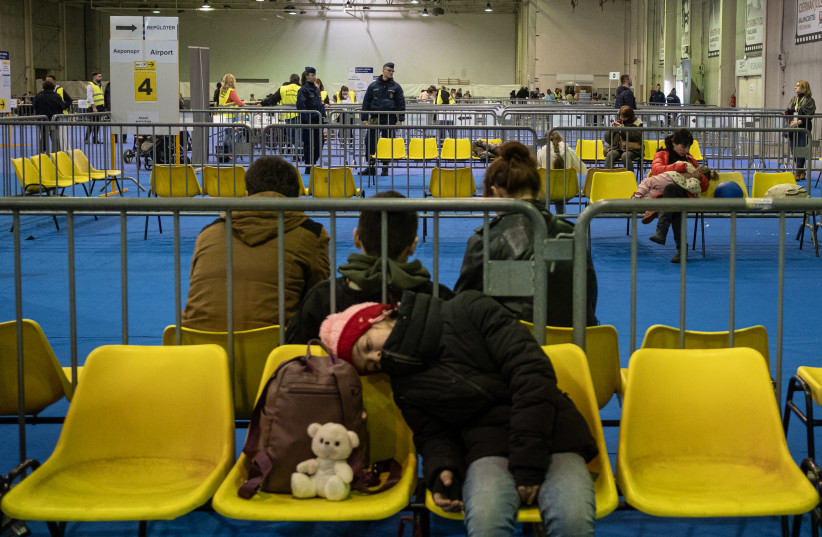When I think about the last two weeks with IsraAID’s emergency response team in Moldova, what comes to my mind first isn’t the bitter cold at the Ukrainian border, the sight of hundreds of newly arrived refugees standing in the snow, waiting to travel on, or even our inspiring Moldovan partner organizations, doing everything they can to respond to a crisis they never expected.
What comes to my mind first is the women. The strong, resilient Ukrainian women, who have become the face of this crisis for me.
At the border crossing of Palanca, the flow of refugees continues unabated day and night, but one of the startling observations is that the vast majority are women and children. Of the 355,000 people that have crossed into Moldova since 24 Feb, 89% are women and children. The fathers, brothers and grandfathers aged 18-60 have been forced to stay and fight, so many drop their families as close to the border as possible for them to continue alone.
When I think about the many women we met, I wonder how I, as a mother of three, would manage if I had to flee my home and make this journey alone.
At Palanca, you see women carrying their belongings and their children, stopping to video call their partners on the other side, as soon as they cross over. The groups are multigenerational: children, mothers, sisters, aunts and grandmothers. Very few travel with baby carriages due to the terrain, and with the subzero temperatures they clutch their well bundled infants in their arms. I can’t help but recognize the weariness that seeps across your face when, as a mother, you just can’t quite give any more to your child, but you must continue. Some are visibly distressed, but many emit a quiet air of stoicism, of female power and strength in the face of this chaos.

IsraAID, together with our local partners, has constructed a mother and child tent at the border. It feels like a sanctuary. It’s a place where mothers and grandmothers can pause on their journeys, breathe and get some respite. The children can play and our volunteers and social workers make sure that everyone has what they need, whether it’s a diaper change ,or just someone to listen.
One woman I met in there was comforting her five-year-old child, who kept asking when they were going home. She turned to her calmly and lovingly told her that it was okay, they were going to a nice, safe place, with kind people. A moment later, when her daughter was busily engaged in the play area in the tent, I saw her turn around and break down. She told our trauma expert that she has no idea where she is going next. Absolutely none.
The tent is one of the only shelters with warmth, light and most importantly, windows – so the women can see outside to watch for the buses that will take them on the next stage of their journeys. Most nights you see children curled up in the children’s area, wrapped in blankets, with their mothers watching from afar, as they wait for morning and the bus they need, or simply while they wait to decide what to do next. Many of the women tell me that they are taking their children to relatives somewhere in Europe to be safe and that they will do the return journey to be with their husbands and fathers back home.
You can see similar sights in the many makeshift shelters currently operating around Chisinau, Moldova’s capital. IsraAID’s education and child protection specialists are running child friendly spaces, with regular activities and games that provide vulnerable children with a chance to begin to process their experiences through play. Many mothers poke their heads in first to check that it’s a safe space for their kids. Once reassured, they tell them to take their shoes off and join in. Sometimes they even stay for a bit to take pictures of their kids being kids. Then, they head back to their beds to think, plan their next moves or even just to be for a short while, safe in the knowledge their children are being cared for. They are mothers, amidst it all.
One of our Ukrainian staff members, who left a mere three weeks ago, told me about the book of dreams she and her children ceremonially write in every night, where they list all the things they want to accomplish while they are in Moldova. Every Sunday, they try to turn some of these dreams into reality. She told me that they have no choice, that dreams are the most important thing she can give her children now.
The situation in Moldova and across the refugee routes around Europe is intense and heartbreaking. We cannot ignore the extreme vulnerability of many of these women. We know there are multiple cases of sexual exploitation, trafficking, smuggling and violence. We heard personal accounts throughout our time in Moldova – women who took private offers of transport from the border and were forced halfway to pay exorbitant amounts for the luxury.
Yet, at the same time, it must be said: Ukrainian women, I am awed by your strength and resilience. What you have achieved even just by making it this far is anything but simple. I know you will do whatever you have to do to keep yourselves and your families safe. IsraAID’s team will be here with you for as long as it takes.
The writer is IsraAID’s senior director of development and communications.
